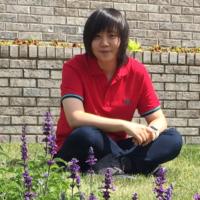The CRA Outstanding Undergraduate Researcher Award recognizes undergraduates who show outstanding research potential in an area of computing. Here’s an update on last year’s awardees. Information on the 2017 competition is available here. The deadline for nominations is Monday, October 24, 2016.
 Lisa Jones, the 2016 female awardee from a non-Ph.D.-granting institution, graduated from West Point. She accepted a Churchill Scholarship, a National Science Foundation Graduate Research Fellowship, and a National Physical Science Consortium fellowship. She was accepted to the computer science doctoral program at Harvard and deferred her admission while she reads for a Master’s in pure mathematics at the University of Cambridge with the support of the Churchill Scholarship. After that, she will return to the United States and complete part of the military service commitment incurred as a graduate of West Point; she was commissioned as a Cyber officer in the US Army, and plans to do in absentia work on her doctorate during this time. Then, she will spend three years at Harvard completing her doctorate in computer science as a member of the theory group.
Lisa Jones, the 2016 female awardee from a non-Ph.D.-granting institution, graduated from West Point. She accepted a Churchill Scholarship, a National Science Foundation Graduate Research Fellowship, and a National Physical Science Consortium fellowship. She was accepted to the computer science doctoral program at Harvard and deferred her admission while she reads for a Master’s in pure mathematics at the University of Cambridge with the support of the Churchill Scholarship. After that, she will return to the United States and complete part of the military service commitment incurred as a graduate of West Point; she was commissioned as a Cyber officer in the US Army, and plans to do in absentia work on her doctorate during this time. Then, she will spend three years at Harvard completing her doctorate in computer science as a member of the theory group.
She said about winning the award: : “It was very gratifying and thrilling to be honored by such an esteemed and internationally recognized organization as the CRA! … I plan to continue doing research in mathematics and computer science topics of interest to national security.”

Photo credit: Lisa Gong
Katherine Ye, the female awardee from a Ph.D.-granting institution, graduated from Princeton University and is pursing a Ph.D. in computer science at Carnegie Mellon University. She would like to be able to continue research and teaching as a professor in academia if possible, but also has interest in working at an industry research lab.
She said that she was “elated and honored” when she found out that she received the award.

Jared Coplin, the male awardee from a non-Ph.D. granting institution, received his bachelor’s degree and is currently pursing a M.S. in computer science at Texas State University, and plans to continue into a Ph.D. program.
He said about winning the award: “I was extremely excited! It was great to have all my hard work recognized by such a prestigious organization.”
 Mitchell Gordon, the male awardee from a Ph.D. granting institution, graduated from the University of Rochester, and is pursuing a Ph.D. in computer science at Stanford University. After his Ph.D. he is considering working in industry or academia, and is currently interning at Google. He plans to complete more industry internships during his Ph.D. and if he becomes a faculty member, he hopes to collaborate closely with industry.
Mitchell Gordon, the male awardee from a Ph.D. granting institution, graduated from the University of Rochester, and is pursuing a Ph.D. in computer science at Stanford University. After his Ph.D. he is considering working in industry or academia, and is currently interning at Google. He plans to complete more industry internships during his Ph.D. and if he becomes a faculty member, he hopes to collaborate closely with industry.
He said about winning the award: “I was very excited and proud when I found out! Prior to being nominated, I wasn’t too familiar with the award. But through the process of applying, and especially after I won it, I was told my many people I admire how competitive the award is. I also felt extraordinarily grateful to all the faculty I’d worked with, as without them I wouldn’t have been able to achieve any success as an undergraduate researcher.”
 Weiyun (Anna) Ma, the female runner-up from a non-Ph.D. granting institution, graduated from Harvey Mudd College and decided to pursue a Ph.D. in theoretical computer science after graduation. After obtaining her Ph.D., she plans to continue working on algorithms and theory research.
Weiyun (Anna) Ma, the female runner-up from a non-Ph.D. granting institution, graduated from Harvey Mudd College and decided to pursue a Ph.D. in theoretical computer science after graduation. After obtaining her Ph.D., she plans to continue working on algorithms and theory research.
She said about winning the award: “I felt very honored and excited when I found out that I was selected as the female runner-up. I was extremely proud of my research team, and would like to thank my teammates and advisor for making this possible.”
 Megan Hofmann, the female runner-up from a Ph.D.-granting institution, took a year long research job with Dr. Jennifer Mankoff at Carnegie Mellon University, and will graduate from Colorado State University in the spring. After than, she plans to pursue a Ph.D. in human computer interaction. She hopes to continue her work which focuses on bringing design techniques from software engineering to the domain of fabrication, and continue to open up new domains for personal fabrication.
Megan Hofmann, the female runner-up from a Ph.D.-granting institution, took a year long research job with Dr. Jennifer Mankoff at Carnegie Mellon University, and will graduate from Colorado State University in the spring. After than, she plans to pursue a Ph.D. in human computer interaction. She hopes to continue her work which focuses on bringing design techniques from software engineering to the domain of fabrication, and continue to open up new domains for personal fabrication.
She said about winning the award:“I was very excited, and a little shocked. It didn’t really strike me until months later. At a conference, a colleague of mine congratulated me. I assumed it was for my talk, but instead he was speaking of this award. In that moment, I was very proud.”
 Rohan Chitnis, the male runner-up from a Ph.D.-granting institution, graduated from the University of California – Berkeley and has started his Ph.D. at MIT in artificial intelligence for robotics. His future plans are to pursue a research-focused career in intelligent robotic systems.
Rohan Chitnis, the male runner-up from a Ph.D.-granting institution, graduated from the University of California – Berkeley and has started his Ph.D. at MIT in artificial intelligence for robotics. His future plans are to pursue a research-focused career in intelligent robotic systems.
He said about winning the award: “I was elated when I found out I won! My professor had encouraged me to apply, explaining that this CRA award is one of the most prestigious undergraduate research awards available!”


